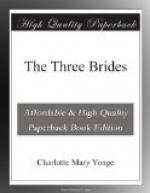“I doubt that,” said Julius. “There are practical directions for an existing state of things, which have been distorted into sanction for its continuance. The actual precepts are broad principles, which are for all times, and apply to the hired servant as well as to the slave. So again with the relations of man and wife; I can nowhere find a command so adapted to the seclusion and depression of the Eastern woman as to be inapplicable to the Christian matron. And the typical virtuous woman, the valiant woman, is one of the noblest figures anywhere depicted.”
“I know,” said Mrs. Tallboys, who had evidently been waiting impatiently again to declaim, “that men, even ministers of religion, from Paul if you like downwards, have been willing enough to exalt woman so long as they claim to sit above her. The higher the oppressed, so much higher the self-exaltation of the oppressor. Paul and Peter exalt their virtuous woman, but only as their own appendage, adorning themselves; and while society with religious ministers at the head of it call on woman to submit, and degrade the sex, we shall continue to hear of such disgraces to England as I see in your police reports—brutal mechanics beating their wives.”
“I fear while physical force is on the side of the brute,” said Julius, “no abstract recognition of equality would save her.”
“Society would take up her cause, and protect her.”
“So it is willing to do now, if she asks for protection.”
“Yes,” broke in Rosamond, “but nothing would induce a woman worth sixpence to take the law against her husband.”
“There I think Lady Rosamond has at once demonstrated the higher nature of the woman,” said Mrs. Tallboys. “What man would be capable of such generosity?”
“No one denies,” said Julius, “that generous forbearance, patience, fortitude, and self-renunciation, belong almost naturally to the true wife and mother, and are her great glory; but would she not be stripped of them by self-assertion as the peer in power?”
“Turning our flank again with a compliment,” said Mrs. Duncombe. “These fine qualities are very convenient to yourselves, and so you praise them up.”
“Not so!” returned Julius, “because they are really the higher virtues!”
“Patience!” at once exclaimed the American and English emancipators with some scorn.
“Yes,” said Julius, in a low tone of thorough earnest. “The patience of strength and love is the culmination of virtue.”
Jenny knew what was in his mind, but Mrs. Tallboys, with a curious tone, half pique, half triumph, said, “You acknowledge this which you call the higher nature in woman—that is to say, all the passive qualities,—and you are willing to allow her a finer spiritual essence, and yet you do not agree to her equal rights. This is the injustice of the prejudice which has depressed her all these centuries.”
“Stay,” broke in Jenny, evidently not to the lady’s satisfaction. “That does not state the question. Nobody denies that woman is often of a higher and finer essence, as you say, than man, and has some noble qualities in a higher degree than any but the most perfect men; but that is not the question. It is whether she have more force and capacity than man, is in fact actually able to be on an equality.”




